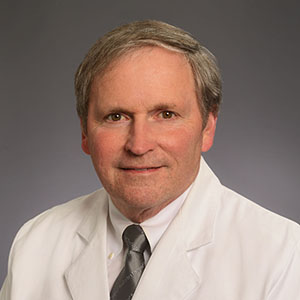A medical detective with a perspective like Sherlock Holmes’
“The more people live with undiagnosed problems, the more distressed they become. People just want an answer, and our approach can bring them emotional relief.”
Clyde Partin’s office window faces Clifton Road, and beyond that, Emory University Hospital, where he was born. In that space, a remarkable medical career has flourished, a personal history steeped in science, influenced by art, and invested in friendships.
Today Dr. Partin is recognized as an expert in rare and undiagnosed diseases, yet Emory interdisciplinary influences remain deep, wide, and abiding. He contributed significantly to a recently published history of the Emory Clinic, and he co-teaches a literature and medicine course. He also writes poetry.
He appreciates an original metaphor, describing his approach to patient care as if peering through a motion movie camera lens. He strives for a long-term dynamic picture of a patient’s life, not a Polaroid shot of a current health crisis.
“Learning about their personal lives and problems, their social history—I try to focus on that,” Partin says. “I try to get a sense of who each patient is, their background, education, family and children, interests, and hobbies. When you look at the whole picture, that’s when you learn what is stressing them. When you discover that there’s been abuse in their childhood or marriage, you can better understand and manage their complaints.” Over time, that movie unwinds and the doctor-patient relationship evolves into a focused living enterprise.
“I have patients who are in their 80s and 90s whom I have seen through births, deaths, grandchildren, family, marital problems, joys, sadness, and triumphs,” he said. “It’s okay to be friends with patients. When good things happen in our lives, we share the elation. I just really enjoy that longitudinal perspective on life.”
Dr. Partin’s devotion was modeled by mentor Paul W. Seavey. They met during Partin’s medical residency, and Dr. Seavey later hired him.
“He was tenacious in trying to find the diagnosis. Very driven,” Dr. Partin said. “He wanted us to take care of patients even we had been up all night. The patient mattered the most, and if he disagreed with your decision, you better be able to defend your reasoning.”
With medical students today, Dr. Partin raises the bar Seavey-style. The transfer of knowledge isn’t enough. He expects students to see themselves as teachers, constantly confronting their own curiosity.
Seavey also believed physicians needed time and support to turn their curiosity into research, and Partin focuses on the history of medicine. He recently published a paper addressing clusters of symptoms, mostly of a psychiatric nature, that can be better understood by classification. This approach benefits people suffering from these symptoms who have no apparent diagnosis.
This productivity and energy benefits patients, students and medical research, and it is all possible because of a clear mission and a committed support staff.
“The old saying is that you’re only as good as your consultants,” Dr. Partin said. “We have an excellent team approach to medicine.”
Specialties
-
Internal Medicine
Education and Training
-
Training: Emory University School of Medicine, 1983
-
Internship: Emory University Affiliated Hospitals, 1984
-
Residency: Emory University Affiliated Hospitals, 1986
Board Certifications
-
American Board of Internal Medicine, 1986


